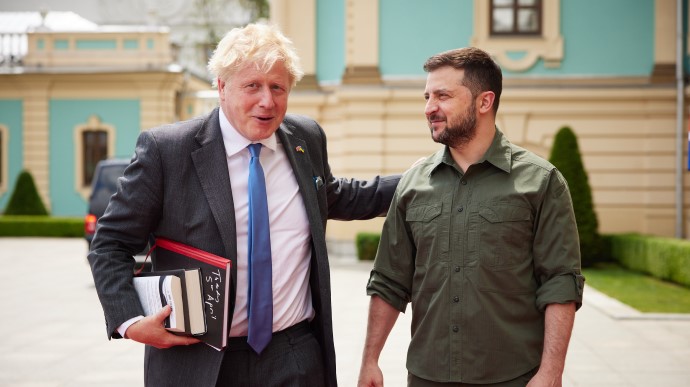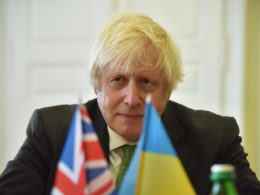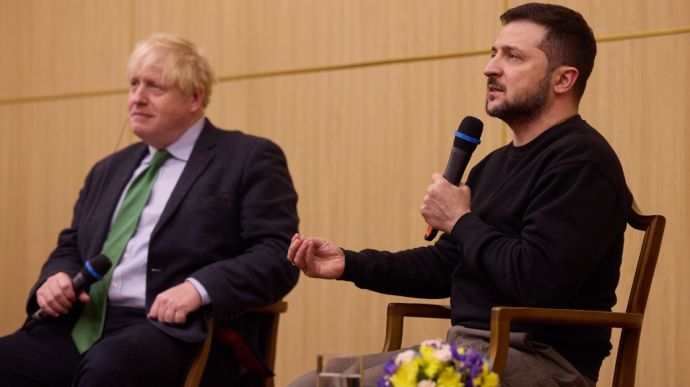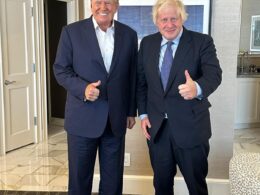In a striking departure from diplomatic norms, former British Prime Minister Boris Johnson called Russian President Putin a "f***ing idiot” who should accept that "there's no more empire” in an interview with Delfi Estonia.
While still in office when Russia’s full-scale war began, Johnson was a vocal advocate for Ukraine, encouraging Western nations to provide military support. He also reportedly advised Ukrainian President Zelenskyy not to pursue any compromises with Russia, believing that a strong resistance was essential to deter further aggression from Moscow. Russian officials accused the former UK leader of interfering, claiming that negotiations could have concluded earlier if not for Johnson's influence in supporting Ukraine's resistance against Russia.
“What Putin is doing is archaic and barbaric, and he needs to understand that Estonia, Latvia, Lithuania - none of these countries are part of the Russian Empire anymore, and the same goes for Ukraine. It's over. O-ver! There's no more empire, Vladimir, you f***ing idiot! Excuse my language. But that's how it is,” Johnson said.
Drawing parallels between Britain's own imperial past and Russia's current actions, Johnson acknowledged that while Britain once controlled an empire "seven times bigger than the Roman Empire," the country has adapted to its post-imperial role.
"You don't need to control other countries. If you love someone, let them go!" Johnson told Delfi Estonia.
In Decemeber, Ukrainian president Zelenskyy also labeled Putin a “dumbass” for suggesting an "interesting" technological experiment that would involve testing a new Russian ballistic missile Oreshnik on Kyiv and harm civilians.
"People are dying, and he thinks it’s 'interesting'... Dumbass,” Zelenskyy said.
Boris Johnson also revealed details about his April 2022 visit to Kyiv, when Russian forces were just 30 kilometers from the Ukrainian capital.
Johnson refuted suggestions that Ukraine could have reached a peace agreement at that time, particularly regarding the Istanbul talks. He explained that Russia's demands - including Ukraine's permanent neutrality and acceptance of Moscow's political control - made meaningful negotiations impossible, especially following the events in Bucha, that revealed Russian mass murder and torture of civilians.
The former British Prime Minister clarified that while Britain wasn't directly involved in Russian-Ukrainian negotiations, his government's policy was to support Ukraine's decision to defend its 1991 borders. He emphasized that no Ukrainian leader could have accepted terms that would have effectively made Ukraine a Russian vassal state.
“We weren't directly involved in Russian-Ukrainian negotiations. I just said what I deeply believed: if Ukrainians decided to fight heroically and if they wanted to defend their rights up to Ukraine's 1991 borders, then British government policy was to support them,” Johnson said.
Johnson believes the West is currently doing enough to prevent Ukraine's defeat but not enough to ensure its victory.
He advocated for a clear roadmap to Ukrainian NATO membership, expressing frustration that this discussion has largely fallen off the international agenda.
“The solution should be Ukraine's NATO membership. People have stopped talking about it. And I think that's a big, big loss, because the West is retreating again,” he said.
Johnson also suggested that had he become prime minister earlier, he might have prevented the war by pushing for Ukraine's NATO membership, characterizing the West's approach to Ukraine as "chronically ambiguous" about whether the country belongs to the Western sphere or Russia's.
He emphasized that temporary solutions are insufficient, and that Article 5 guarantees or long-term NATO membership are essential for resolving Ukraine's security situation.
“It seems we're willing to do enough to prevent Ukraine's defeat, but not enough to ensure Ukraine's victory,” Johnson stated.
The former prime minister expressed particular concern about his inability to influence these decisions after leaving office two and a half years ago, suggesting that the West needs to be more decisive in its approach to Ukraine's future.
Related:
- Boris Johnson: Ukraine’s problem cannot be resolved without long-term NATO membership
- UK troops may aid Ukraine border defense under potential ceasefire, Boris Johnson says
- Le Monde: Secret discussions on sending troops to Ukraine resume in Europe
- FP analysis suggests Ukraine could pursue nuclear arms if denied NATO membership
- Zelenskyy reveals Trump talk on Ukraine’s NATO plea, cites Budapest Memorandum failings
- Boris Johnson: We, the West, always end up giving what is needed but way too late





